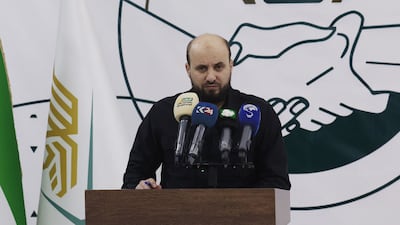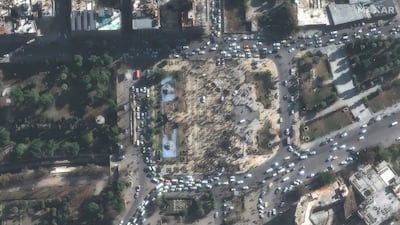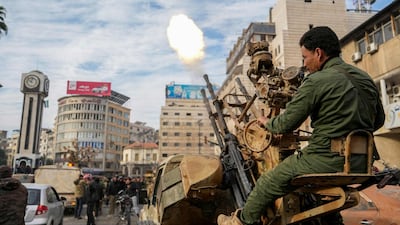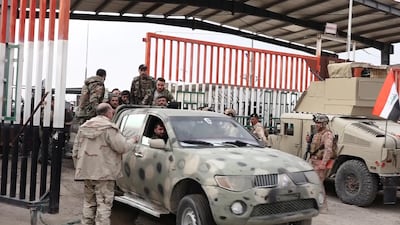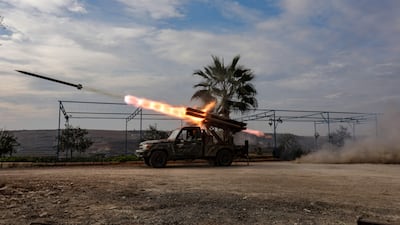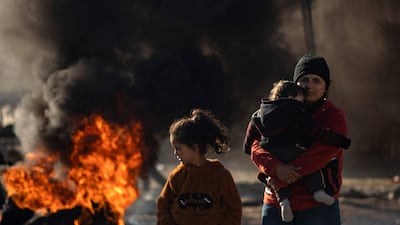For years, the consensus in Washington was that Syria's battle lines had gone cold amid a stalemate in fighting and President Bashar Al Assad's recapture of much of the country's territory, with help from Russia and Iran.
But the frozen conflict's sudden thaw has challenged that assumption at a pivotal moment of change in the US.
About 50,000 people have been displaced amid intense fighting after Syrian rebels launched a shock offensive against the Assad regime last week that saw them retake Aleppo. Opposition fighters are now advancing on the central city of Hama, according to a war monitor, in the most significant challenge to the regime's survival in years.
For anti-Assad and Syrian democracy advocates in Washington such as Mouaz Moustafa, the executive director of the Syrian Emergency Task Force: “Syria was nothing but forgotten under the Biden administration.” He says that the response to the renewed conflict has so far been confused.
Emerging as a key player in the complex cornucopia of Syrian opposition is rebel group Hayat Tahrir Al Sham, an internationally designated umbrella organisation that has worked to moderate itself into a more mainstream political actor and a viable alternative to the Assad regime.
Steven Heydemann, a professor of Middle East studies at Smith College and a non-resident senior fellow at the Brookings Institution, says events have called “a number of base assumptions into question, and one of them is that the conflict had become frozen", he told The National. “That has been completely torn apart.”
Syria has at times appeared to divide the Biden administration – and the US President's fellow Democrats.
Representative Brendan Boyle, the Democratic co-chair of the Congressional Syria Caucus, told The National that: “Syria remains the forgotten war of our generation, with millions of innocent civilians killed and displaced – a tragic reminder that this conflict is far from resolved.”

President Joe Biden's departing administration has maintained an anti-normalisation stance with the Assad regime, but that grew more complicated as regional normalisation efforts accelerated after the devastating 2023 earthquakes in southern Turkey and northern Syria.
And as the Arab League moved to readmit Mr Al Assad, the White House told The National it was “encouraged” by an Amman conference that centred on that pivotal step.
That came after Barbara Leaf, assistant secretary of state for Near Eastern affairs, also appeared to soften Washington's stance, advocating that those re-establishing relations should “get something” from Mr Al Assad in turn, such as promises to curb the regime-accelerated Captagon drug trade.
Congressman French Hill, the Republican co-chair of the Syria Caucus who has led on Washington's policy towards Damascus, says that “the Biden-Harris administration’s public policies have supported the creeping normalisation that let Syria back into the Arab League with zero conditions", he told The National.
Mr Boyle, his Democratic counterpart, on the other hand stressed that “the Biden administration had no role in the latest offensive", arguing that while “US influence on the ground is limited, we have a moral obligation to hold Assad accountable for his egregious human rights abuses".
The White House has pointed the finger at the Assad regime's “reliance on Russia and Iran” for the current escalations, National Security Council spokesman Sean Savett said in a statement.
But “the United States has nothing to do with this offensive, which is led by [Hayat Tahrir], a designated terrorist organisation. The United States, together with its partners and allies, urge de-escalation, protection of civilians and minority groups".
Mr Moustafa finds such statements from the Biden administration are lacking.
“It doesn't make sense, the fact that they're calling for a de-escalation of the liberation of Syria from Iran. Doesn't make sense, not just from a humanitarian perspective, from a national interest or even allies in a region perspective”, he told The National.
Mr Heydemann says, though, that “to be fair, the Biden administration doesn't differ all that much in its approach to Syria from either [former president Barack] Obama or the first Trump terms".
Hayat Tahrir's terrorism designation has re-emerged as a point of contention in Washington as the rapidly developing situation in Syria plays out. The International Crisis Group said it has had “a chilling effect on western support for essential service provision in Idlib, worsening the humanitarian crisis".
“It has also precluded discussions with [Hayat Tahrir] itself about its conduct and the future of the territory it controls,” analysis from the think tank argued at the start of the Mr Biden's term in 2021.
Mr Moustafa, who has been in contact with the opposition coalition in Aleppo and just returned from a visit with the US Department of Defence to the Al Tanf garrison in Syria's southern safe zone, believes Washington's approach to Hayat Tahrir needs to change.
He argues the militant group has “been beyond pragmatic, to say the least” as they've navigated the resurgent battle against the regime. “I don't agree with every single faction's political ideology, but actions really are what define how we should make our minds up about how we look at this.”
Others are not so quick to trust the group. Mr Heydemann said Washington and its allies should for now be “watching HTS carefully.”
He believes that a degree of engagement “would be appropriate” to “offer some sense of what [the US] expects from HTS, as it now assumes the role of governing authority in Aleppo, a city of two and a half million people, including many minorities.”
But as the lines of power again blur in war-torn Syria, a more predictable changing of the guard in Washington is about to unfold, with president-elect Donald Trump moving back into the White House for his second term in January.
That already had implications for the US posture towards Syria: During Mr Trump's first term between 2017-2021, he ordered strikes against the Assad regime and tried to withdraw Washington's 900 or so troops from Syria.
He has also nominated Tulsi Gabbard, who met Mr Al Assad in 2017 and has taken a more sympathetic posture towards Russia, to lead US intelligence in the new government coming into power this January.
Ms Gabbard, who previously ran as a Democrat for the presidency, has called Washington's operations in Syria a “regime change war” and said that Mr Al Assad is “not an enemy” of Washington.
Mr Hill, who has advocated forcefully in favour of Israel's military operation in Gaza and against Russian President Vladimir Putin's invasion of Ukraine, told The National that “it is not surprising that Assad’s forces fell so quickly given that Assad’s former allies do not have the capacity to support his regime while at the same time funding the invasion and murder of free Ukrainians and Israeli citizens".
But at least so far, the rapid developments have not moved the needle enough to change Mr Trump's probable stance on Syria.
Mr Heydemann predicted that the new Trump administration would look “fairly favourably on the idea of a joint Turkish-Russian resolution of north-east in Syria".
In 2019, during Mr Trump's first administration, Russia and Turkey negotiated a 10-point safe zone deal that fulfilled Ankara's demand that Kurdish forces be pushed about 30km from the Syrian-Turkish border.
That deal also succeeded in moving Turkey “deeper into Russia’s orbit,” argued the US Institute of Peace's vice president of its Middle East and North Africa Centre, Mona Yacoubian.
“It effectively pulls Turkey even further away from the western orbit with potentially significant implications for Nato,” she wrote in analysis for USIP.



